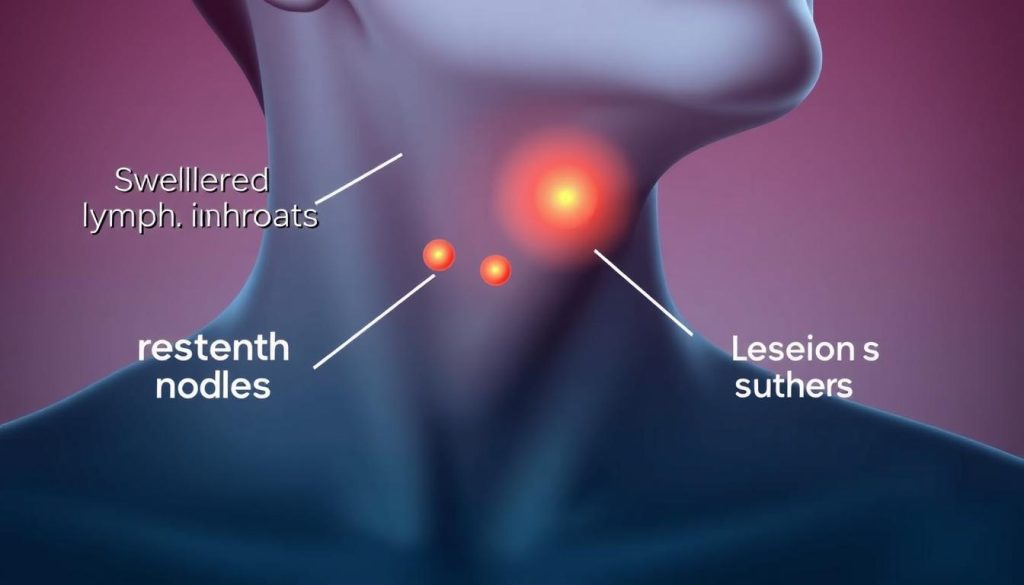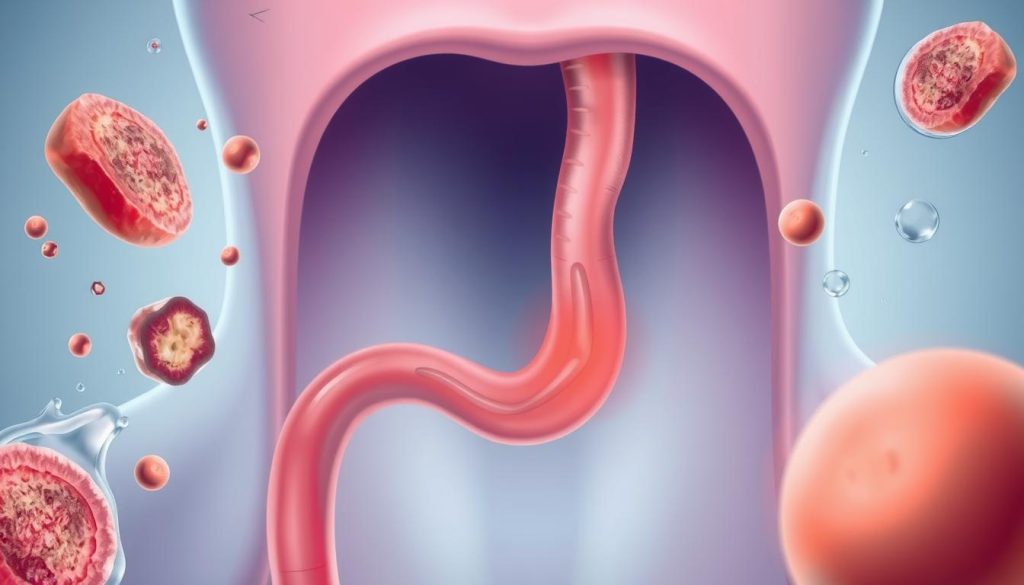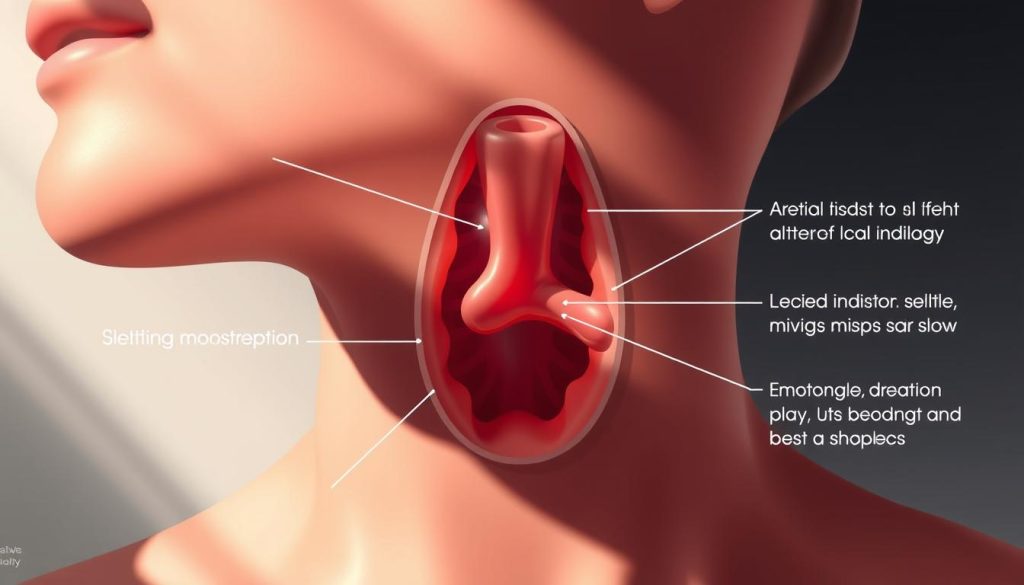Throat cancer can sneak up quietly, making early detection key. Recognizing throat cancer symptoms early can save lives. Signs like a persistent cough or unexpected ear pain should not be ignored.
Knowing the key indicators helps you take control of your health. This guide covers common symptoms, risk factors, and when to see a doctor. By staying informed, you can spot issues early and get timely treatment.
Let’s explore the important info on throat cancer warning signs. With this knowledge, you’ll be ready to protect your health and seek help when needed.
Understanding Throat Cancer: An Overview
Throat cancer is a serious condition that affects the throat and nearby areas. It can cause various symptoms, including hoarseness and difficulty swallowing. Let’s explore the different types, risk factors, and affected areas to better understand this disease.
Types of Throat Cancer
Throat cancer comes in several forms, each affecting different parts of the throat:
- Laryngeal cancer (voice box)
- Pharyngeal cancer (upper throat)
- Oropharyngeal cancer (back of the mouth)
Risk Factors and Causes
Several factors can increase the risk of developing throat cancer:
| Risk Factor | Impact Level |
|---|---|
| Tobacco use | High |
| Excessive alcohol consumption | High |
| HPV infection | Moderate |
| Poor diet | Low to Moderate |
Affected Areas of the Throat
Throat cancer can impact various regions, leading to different symptoms:
- Vocal cords: Often results in hoarseness
- Pharynx: May cause difficulty swallowing
- Tonsils and base of the tongue: Can affect speech and swallowing
Understanding these aspects of throat cancer helps in recognizing symptoms early. If you experience persistent hoarseness, difficulty swallowing, or other unusual changes, consult a healthcare professional promptly.
Common Throat Cancer Symptoms

Spotting throat cancer symptoms early is key to effective treatment. A sore throat that lasts more than two weeks is a red flag. If you have a sore throat for over two weeks, see a doctor.
A lump in the neck is another warning sign. It might mean cancer has spread to lymph nodes. Not all neck lumps are cancer, but any new swelling needs a doctor’s check.
Other common symptoms include:
- Difficulty swallowing or feeling like food is stuck in the throat
- Persistent hoarseness or changes in voice
- Unexplained weight loss
- Ear pain, specially on one side
- Coughing up blood
Remember, these symptoms can also have other causes. But if they keep happening, get medical help. This is important for the right diagnosis and treatment.
Persistent Hoarseness and Voice Changes
Voice changes are common signs of throat cancer that should not be ignored. If hoarseness lasts for weeks, it could be a serious sign. Let’s look at these voice changes and when to get help.
Duration of Voice Changes
Hoarseness from a cold or flu usually goes away in days. But, throat cancer symptoms can last longer. If your voice stays raspy or weak for over two weeks, it’s time to act.
Quality of Voice Alterations
Throat cancer can cause different voice changes:
- Raspy or breathy tone
- Decreased volume
- Difficulty hitting high notes
- Vocal fatigue
When to Seek Medical Attention
Don’t wait to see a doctor if you notice:
| Symptom | Duration | Action |
|---|---|---|
| Persistent hoarseness | Over 2 weeks | See a doctor |
| Voice changes with pain | Any duration | Urgent evaluation |
| Sudden loss of voice | Immediate | Emergency care |
Early detection is key for effective treatment. If you’re worried about persistent hoarseness or other symptoms, see your healthcare provider quickly.
Difficulty Swallowing (Dysphagia)
Difficulty swallowing, or dysphagia, is a concerning symptom of throat cancer. It makes eating and drinking hard for those affected. This symptom can show up in different ways.

People with dysphagia might feel like food is stuck in their throat or chest. They could cough or choke while eating. Swallowing liquids might also hurt.
To manage this, some might need to eat softer foods or liquids. Dysphagia happens when throat cancer affects the muscles and nerves for swallowing. As tumors grow, they can block the food and drink path, causing discomfort and weight loss.
- Sensation of food lodged in the throat
- Pain while swallowing
- Coughing or choking during meals
- Inability to swallow certain foods or liquids
If you have trouble swallowing often, see a doctor right away. Dysphagia can be from other issues too. But with throat cancer symptoms, it’s urgent to get checked and treated.
Chronic Sore Throat and Pain
A sore throat that won’t go away is a common issue. But, if it lasts, it could mean something serious. Chronic throat pain is a sign of throat cancer that should not be ignored.
Distinguishing Cancer Pain from Common Infections
Cancer pain doesn’t go away like a cold does. It doesn’t get better with usual treatments like lozenges or pain meds. If your sore throat lasts over two weeks, you need to see a doctor.
Pain Patterns and Characteristics
Throat cancer symptoms include a constant, dull ache. This pain gets worse when you swallow. Some people feel a burning or like something is stuck in their throat. Pain that goes to the ears is a big warning sign.
Associated Symptoms
A sore throat that lasts is often not alone when it’s cancer. Look out for these signs too:
- Difficulty swallowing
- Persistent hoarseness
- Unexplained weight loss
- Swollen lymph nodes in the neck
Seeing these symptoms doesn’t mean you have cancer. Many things can cause a sore throat. But, if you’re worried about ongoing pain or unusual changes, get checked by a doctor.
Unexplained Lumps in the Neck
A lump in the neck is a worrying sign of throat cancer. These lumps often appear without a clear reason, which can be alarming. Neck lumps from throat cancer are usually firm and don’t move when touched.
Throat cancer can cause lumps in different neck areas. The location depends on the affected throat part. Here’s a look at common lump locations and what they might mean:
| Lump Location | Possible Indication |
|---|---|
| Upper neck, near jawline | Oral cavity or oropharyngeal cancer |
| Mid-neck, side of throat | Laryngeal or hypopharyngeal cancer |
| Lower neck, near collarbone | Advanced stage throat cancer |
Not all neck lumps mean cancer. Many are caused by harmless conditions. But, if a lump persists or grows, see a doctor right away. Catching throat cancer early, like through neck lumps, can greatly help treatment.
Persistent Cough and Respiratory Changes
A persistent cough is a symptom of throat cancer that should not be ignored. This section looks at different coughs and breathing problems that could mean something serious.
Types of Coughs to Watch For
Not all coughs are the same. Some coughs, like those related to throat cancer, are more concerning:
- Dry, hacking cough that doesn’t go away
- Cough that worsens over time
- Coughing up blood or rust-colored sputum
- Nighttime coughing that disrupts sleep
Associated Breathing Issues
Throat cancer can also lead to other breathing problems:
| Breathing Issue | Description |
|---|---|
| Shortness of breath | Feeling like you can’t get enough air |
| Wheezing | High-pitched whistling sound when breathing |
| Stridor | Harsh, raspy breathing noise |
If you have a persistent cough or any breathing issues for over three weeks, see a doctor. Catching throat cancer early can improve treatment results.
Unexplained Weight Loss and Appetite Changes
Weight loss and changes in appetite are common signs of throat cancer. These symptoms can sneak up on you. It’s important to know them for early detection and better treatment.

Unexplained weight loss in throat cancer can be quite noticeable. Patients might lose 5% or more of their body weight in six months without trying. This happens for several reasons:
- Difficulty swallowing
- Pain while eating
- Reduced appetite
- Increased metabolism due to cancer
Changes in appetite are closely tied to weight loss. Cancer can mess with hormone levels and metabolism, making you less hungry. Some people feel full after eating just a little.
Not all weight loss is due to cancer. But, if you’re losing weight without trying and have other symptoms, see a doctor. Regular check-ups and being aware of body changes help catch problems early.
| Weight Loss Indicator | Possible Cause | Action Required |
|---|---|---|
| 5-10% in 6 months | Mild concern | Monitor closely |
| >10% in 6 months | Significant concern | Consult doctor immediately |
| Rapid loss with other symptoms | High risk | Urgent medical evaluation |
If you’re losing weight or appetite changes and have throat issues, get medical help. Early action can greatly improve treatment results for throat cancer and other serious conditions.
Ear Pain and Referred Symptoms
Ear pain can be a surprising symptom of throat cancer. It often goes unnoticed. The connection between throat and ear discomfort comes from shared nerve pathways. When throat cancer affects these pathways, it can send pain signals to the ears.
Connection Between Throat and Ear Pain
The throat and ears are linked by nerves and muscles. Throat cancer can irritate these connections, causing pain in the ears. This pain might feel sharp, dull, or like a burning sensation.
It’s important to remember that not all ear pain is from throat cancer. But, if the pain lasts for weeks, it’s time to see a doctor.
Distinguishing Cancer-Related Ear Pain
Cancer-related ear pain is different from usual ear infections. Look for these signs:
- Pain that lasts for weeks without getting better
- Discomfort that gets worse when swallowing
- Ear pain with other symptoms like hoarseness or trouble swallowing
- Pain that affects one ear more than the other
If you have ongoing ear pain and changes in your throat, voice, or swallowing, see a doctor fast. Catching throat cancer symptoms early, like unusual ear pain, can help with treatment.
Changes in Breathing Patterns
Breathing difficulties are a lesser-known throat cancer symptom. Tumors can block airways, causing breathing changes. People might feel short of breath, wheeze, or feel like they can’t catch their breath.

Some throat cancer patients feel like something is blocking their airway. This can lead to noisy breathing or stridor, a high-pitched sound when inhaling. In bad cases, breathing can be hard, even when sitting or lying down.
These breathing changes often happen with difficulty swallowing. If you have breathing problems and other throat symptoms, see a doctor fast.
- Shortness of breath
- Wheezing or noisy breathing
- Feeling of airway obstruction
- Difficulty breathing while lying down
Early detection is key to treating throat cancer well. Don’t ignore breathing changes, even if they seem small. Getting medical help quickly can greatly improve your treatment and outcome.
Bad Breath and Oral Changes
Bad breath, or halitosis, can be a sign of throat cancer. Many people don’t know that bad breath could mean something serious. Throat cancer can change how we breathe and our oral health.
Throat cancer symptoms often show up in the mouth and throat. These symptoms can mess with saliva and bacteria, causing bad breath. Some people also notice a metallic or sour taste in their mouth, which can make breath worse.
Oral changes linked to throat cancer include:
- White or red patches in the mouth
- Bleeding gums
- Difficulty moving the tongue
- Sores that don’t heal
If you have bad breath that won’t go away and other symptoms, see a doctor. Bad breath by itself doesn’t always mean cancer. But, if it’s with other symptoms like trouble swallowing or hoarseness, it’s important to check it out.
Early detection is key in treating throat cancer. Don’t ignore changes in your mouth or bad breath. Regular dental visits can spot early signs of problems, helping catch throat cancer sooner.
When to Contact Your Healthcare Provider
Spotting throat cancer symptoms early is very important. It can greatly improve treatment results. If you notice any signs that last, see a doctor right away.
Red Flag Symptoms
Watch out for these signs that might mean throat cancer:
- Prolonged hoarseness lasting more than three weeks
- Persistent difficulty swallowing
- Unexplained weight loss
- Chronic sore throat or ear pain
- Lumps in the neck or throat area

Medical History Documentation
Keep a detailed record of your symptoms, including:
- When throat cancer symptoms first appeared
- How often they occur
- Any factors that seem to worsen or alleviate them
- Changes in severity or frequency over time
Preparing for Your Appointment
To get the most from your doctor’s visit:
- Write down questions about your symptoms and concerns
- Bring your symptom log and medical history
- List all medications and supplements you’re taking
- Consider bringing a friend or family member for support
Remember, catching it early is key. Don’t wait to see your healthcare provider if you notice changes in your throat, voice, or swallowing.
Diagnostic Process and Early Detection
Finding throat cancer early is key to treating it well. Doctors start a detailed check when symptoms don’t go away. They use tests to find and understand the cancer’s stage.
The first step is a physical check. Your doctor looks for signs like a neck lump. They also talk about your health history and symptoms, like a cough or trouble swallowing.
- Endoscopy: A thin, flexible tube with a camera examines your throat
- Biopsy: Tissue samples are taken for laboratory analysis
- Imaging tests: CT scans, MRIs, or PET scans provide detailed images of your throat
- Blood tests: These can reveal overall health and possible cancer markers
The testing process can be scary, but finding cancer early makes a big difference. If you keep feeling throat cancer symptoms, see your doctor right away.
| Diagnostic Test | Purpose | Duration |
|---|---|---|
| Endoscopy | Visual examination of throat | 15-30 minutes |
| Biopsy | Tissue analysis for cancer cells | 30 minutes – 1 hour |
| CT Scan | Detailed throat imaging | 10-30 minutes |
| Blood Tests | Overall health assessment | 5-10 minutes (draw time) |
Prevention and Risk Reduction Strategies
Preventing throat cancer is possible by taking certain steps. Quitting tobacco use is key, as smoking and chewing tobacco are big risks. If you’re trying to quit, your doctor can help with programs.
Drinking less alcohol is also important, as heavy drinking raises your risk. Eating a diet full of fruits and veggies boosts your immune system. This helps fight off throat cancer.
Regular exercise and a healthy weight are vital too. Being overweight can increase your cancer risk, including throat cancer symptoms like a sore throat.
Protecting yourself from HPV through vaccination and safe sex can lower throat cancer risk. Regular dental visits are important, as poor oral hygiene can lead to throat cancer. Always wear protective gear when working with harmful chemicals.
While these steps can lower your risk, knowing throat cancer symptoms is key. Look out for unexplained weight loss, trouble swallowing, or a sore throat that lasts more than two weeks. If you notice these, see your healthcare provider right away.
FAQ
Q: What are the most common throat cancer symptoms?
A: Common symptoms include hoarseness that lasts, trouble swallowing, and a sore throat that won’t go away. You might also notice lumps in your neck, a persistent cough, and unexplained weight loss. Other signs include ear pain, breathing changes, and bad breath.
Q: How long does hoarseness need to persist before I should be concerned?
A: If hoarseness lasts over three weeks without a clear reason, see a doctor. It could be a sign of throat cancer.
Q: Can throat cancer cause ear pain?
A: Yes, it can. This is called referred pain, where you feel pain in a different area. If you have ear pain without a clear reason, see a doctor.
Q: What does a cancerous lump in the neck feel like?
A: A cancerous lump is firm, doesn’t move, and is painless. It might grow. But, not all lumps are cancer. Only a doctor can tell for sure.
Q: How is throat cancer diagnosed?
A: Doctors use physical exams, imaging like CT scans, and biopsies to diagnose. They might also use endoscopy to look inside your throat and take samples.
Q: Can throat cancer be prevented?
A: Not all cases can be prevented, but you can lower your risk. Avoid tobacco and alcohol, eat healthy, and protect against HPV. Regular dental visits can also help find problems early.
Q: Is a persistent cough always a sign of throat cancer?
A: No, it’s not always throat cancer. Coughs can be from allergies, acid reflux, or infections. But, if it lasts over 8 weeks or has blood, see a doctor.
Q: How does throat cancer affect swallowing?
A: It can make swallowing hard or painful. You might feel like food is stuck or have a burning sensation. If swallowing is a problem, talk to your doctor.
Q: Can throat cancer cause bad breath?
A: Yes, it can. Tumors, infections, or changes in bacteria can cause bad breath. But, bad breath can also mean other things. See a dentist or doctor if it persists.
Q: What should I do if I’m experiencing throat cancer symptoms?
A: If you have symptoms like hoarseness, swallowing trouble, or neck lumps, see a doctor. Early detection is key. Don’t wait to get checked if you’re worried.


















